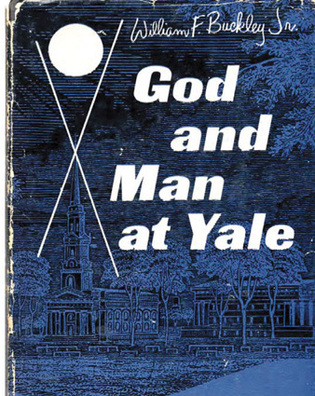 loading
loading
William F. Buckley: the ideologue Richard Nash GouldThe credo of Buckley's indictment of Yale: "I myself believe that the duel between Christianity and atheism is the most important in the world." View full image
Meanwhile, on campus, Buckley was hard at work on God and Man. The Yale establishment knew what was coming. Chaplain Sidney Lovett ’13 -- himself a target of the book because of the relaxed character of his popular course on the Bible (known to generations as "Cokes and smokes") -- reported that prominent alumni who had seen advance text were favorably impressed. "Bill," wrote the chaplain in a letter to historian George W. Pierson ’26, ’33PhD, The book was published in October 1951. Griswold found himself accused of dereliction for not mentioning religion in his inaugural address. Yale officialdom reacted in three ways. In his most formal and public response, Griswold appointed a committee of venerable alumni and worthies of the Corporation (Yale's board of trustees) to survey "the intellectual and spiritual welfare" of the university, its students, and its faculty. The chair was the Reverend Henry Sloane Coffin ’97; the youngest member was Edwin (Ted) Blair ’24 of the Yale Corporation. The average age was 66. The committee talked with a few faculty, university officials, and alumni, but did not talk with students. Its four-page report -- firm on affirmation, weak on evidence -- was sent to all alumni. Without actually mentioning Buckley, the report announced that faculties were not "trying to . . . indoctrinate students at Yale with subversive theories." And: "the moment the classroom presentation of an unpopular position is restricted or prohibited by university mandate, the search for truth is checked and the integrity of the university comes into question." As for religion, "the committee believes that religious life at Yale is deeper and richer than it has been in many years and stronger than in most places outside the University. The charge that Yale is encouraging irreligion is without foundation." Unofficially, the Yale administration encouraged and circulated published rebuttals to Buckley, especially an excoriating essay in the Atlantic Monthly by McGeorge Bundy ’40 (soon to be dean of faculty at Harvard). Bundy denounced God and Man for "insidious innuendos" based on dishonest use of flimsy and unverifiable evidence. The chapter on economics, said Bundy, showed Buckley "to be a twisted and ignorant young man." Bundy concluded with three predictions: Griswold avoided direct public comment, but in private mingled the lofty approach of the Coffin committee with the Bundy bite. "I am only saddened," he told a classmate and loyal alumnus who had found Buckley's arguments persuasive, "to see how many of our alumni have been willing to believe him [Buckley] without making any effort to investigate the facts for themselves." What actually happened in Yale's classrooms was almost irrelevant for Buckley's concept of the nature and goals of teaching. It was not important to him to distinguish between outright attacks on religion and failure to proselytize; both were sins. His sources on teaching were selective quotations from textbooks and word of mouth from students who shared his views. He spurned suggestions that he talk with professors whom he was accusing of irreligion and hostility to free-market economics. His allegations of "collectivism" dealt almost entirely with the economics department. (The charges reverberated for years, so that Woodbridge Hall and economics chair Lloyd G. Reynolds and his colleagues pursued sustained efforts to persuade critics of the department's strength.) But lest other departments be considered innocent, he simply declared them guilty: a "complete survey would take us into the departments of political science, history, sociology, and others." God and Man did not cause Yale to reexamine its principles, but it did lead to more extensive and effective communications with alumni, evolving from the unimaginative Alumni Board of the 1950s to, eventually, the multifaceted Association of Yale Alumni. (This magazine, unspeakably dreary in the 1950s -- on that I agree with Buckley -- improved decade by decade.) I was involved in this process, in a minor way. President Griswold offered me a job as one of four members of the development office. I worked there for 12 months in 1954-55 before going to graduate school. A large part of my assignment was to prepare reports on what was happening in Yale College and to draft responses to alumni who thought Yale was going to hell. The most important change in Yale, however, would have proceeded had Buckley never written: the predominance of large lecture courses relying on textbooks was replaced by courses requiring students to think for themselves. On a personal note: I met Bill Buckley first in the spring of 1951 as a freshman and aspiring Yale Daily News editor. My colleagues may not have believed in God (I never asked) but we certainly believed in Bill's extraordinary brilliance—although not necessarily in his big ideas. Years later, a common addiction to oceans brought us together. In 1978 when I was master of Pierson College I invited Bill to speak on sailing. The Pierson dining hall was packed literally to the window sills. We agreed to say nothing about politics. It was a wonderful evening.
The comment period has expired.
|
|